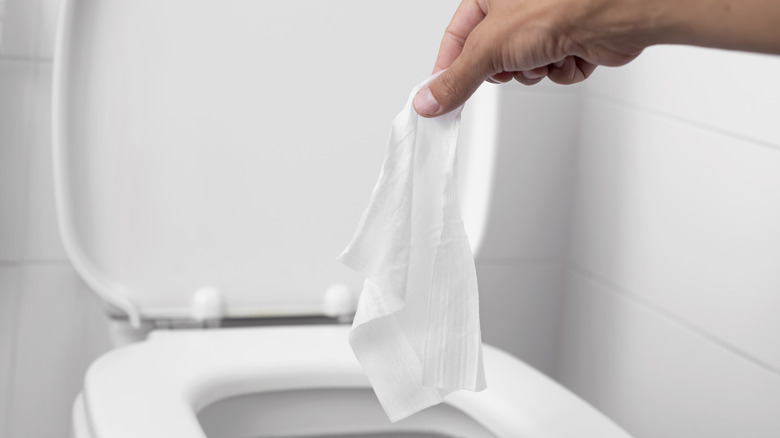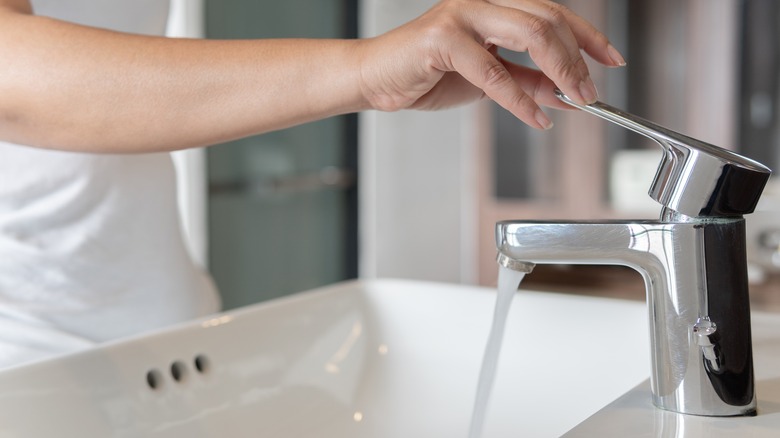Feminine Wipes Might Be Doing You More Harm Than Good
A good hygiene routine is essential for overall good health, and as such, many of us strive to stay clean and well cared for, whether it comes to a regular tooth brushing routine or proper skincare. But where it comes to intimate care, things can get a little confusing. Often, when women notice an odor, an itch, or some other discomfort, they will reach for intimate cleansing wipes thinking that will solve the issue. It makes sense; ads for feminine hygiene products have long-touted their ability to make us feel "fresh." But unfortunately, we may have been mislead in that regard.
In an ideal world, feminine hygiene wipes would be used to wipe away any impurities that have accumulated over the course of the day, be it during a workout, a trip to the beach, an intimate encounter, etc. (via Stop UTI Forever). But in many cases, depending on the ingredients in the wipes and the particularities of the person using them, these cleansing wipes can cause allergic reactions, discomfort, or an imbalance that can lead to either yeast infections or other infections.
What you need to know
A study published in the scientific medical journal BMS Women's Health found a direct association between feminine hygiene products like wipes and adverse health conditions (via Health Shots). And that's not the only study to come to such a conclusion. Another one, published in the journal Microbial Encology and Disease, found that products like vaginal wipes and washes interfere with natural vaginal moisture, which, contrary to common belief, is actually essential for preventing infections and disease (not the cause of it).
Your vagina is actually a self-cleaning organ, which is why you get discharge. Discharge, unless an unusual color or foul-smelling, is generally not unhealthy. And if you do find that you are experiencing abnormal discharge, then seeing your doctor is a much better bet than using wipes or washes. Since a healthy vagina cleanses itself, using chemical-laden wipes that often have preservatives and fragrance can throw off your balanced pH.
As Dr. Seema Jain, associate director of obstetrics and gynecology at Max Super Specialty Hospital in Shalimar Bagh, Delhi tells Health Shots, "Women should avoid using intimate wipes and other feminine hygiene products because the fragrances and preservatives in these products are not good for your vagina."
So what should you do instead?
It's perfectly understandable that you would want to make sure your vaginal area is clean, just like any other part of your body, but you can't actually cleanse it like you do every other part of your body if you want it to remain healthy. "You never wash your vagina under any circumstances," Lauren Streicher, M.D., an associate professor of clinical obstetrics and gynecology at Northwestern University Feinberg School of Medicine tells Self. "That should never be done," she reiterates.
Okay, so what are we supposed to do, then?
First of all, it's important to note that while many people colloquially use "vagina" to describe everything happening down there, that is not accurate. The vagina really only describes the inner portion of the sex organ; vulva is the term that refers to the outside, which includes the labia minora and majora, as well as the entrance to the urethra, the entrance to the vagina, and the clitoris. Your vagina should never be cleansed; it does it itself. Your vulva, however, can accumulate impurities, so you may feel the need to cleanse it sometimes. But the only thing you should be using is plain old water.
Using anything else can upset the natural balance of things, mess with your pH, and open the door to yeast infections, bacterial infections, allergic reactions, and other issues.


